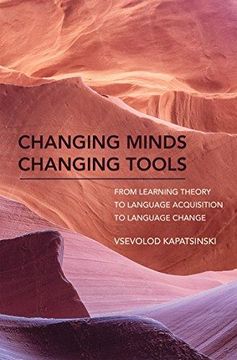Compartir
Changing Minds Changing Tools: From Learning Theory to Language Acquisition to Language Change (The mit Press) (en Inglés)
Vsevolod (Associate Professor, University Of Oregon) Kapatsinski (Autor)
·
The Mit Press
· Tapa Dura
Changing Minds Changing Tools: From Learning Theory to Language Acquisition to Language Change (The mit Press) (en Inglés) - Vsevolod (Associate Professor, University Of Oregon) Kapatsinski
$ 72.250
$ 120.420
Ahorras: $ 48.170
Elige la lista en la que quieres agregar tu producto o crea una nueva lista
✓ Producto agregado correctamente a la lista de deseos.
Ir a Mis Listas
Origen: Estados Unidos
(Costos de importación incluídos en el precio)
Se enviará desde nuestra bodega entre el
Jueves 30 de Mayo y el
Martes 11 de Junio.
Lo recibirás en cualquier lugar de Chile entre 1 y 3 días hábiles luego del envío.
Reseña del libro "Changing Minds Changing Tools: From Learning Theory to Language Acquisition to Language Change (The mit Press) (en Inglés)"
A book that uses domain-general learning theory to explain recurrent trajectories of language change.In this book, Vsevolod Kapatsinski argues that language acquisition―often approached as an isolated domain, subject to its own laws and mechanisms―is simply learning, subject to the same laws as learning in other domains and well described by associative models. Synthesizing research in domain-general learning theory as it relates to language acquisition, Kapatsinski argues that the way minds change as a result of experience can help explain how languages change over time and can predict the likely directions of language change―which in turn predicts what kinds of structures we find in the languages of the world. What we know about how we learn (the core question of learning theory) can help us understand why languages are the way they are (the core question of theoretical linguistics).Taking a dynamic, usage-based perspective, Kapatsinski focuses on diachronic universals, recurrent pathways of language change, rather than synchronic universals, properties that all languages share. Topics include associative approaches to learning and the neural implementation of the proposed mechanisms; selective attention; units of language; a comparison of associative and Bayesian approaches to learning; representation in the mind of visual and auditory experience; the production of new words and new forms of words; and automatization of repeated action sequences. This approach brings us closer to understanding why languages are the way they are, Kapatsinski contends, than approaches premised on innate knowledge of language universals and the language acquisition device.
- 0% (0)
- 0% (0)
- 0% (0)
- 0% (0)
- 0% (0)
Todos los libros de nuestro catálogo son Originales.
El libro está escrito en Inglés.
La encuadernación de esta edición es Tapa Dura.
✓ Producto agregado correctamente al carro, Ir a Pagar.

